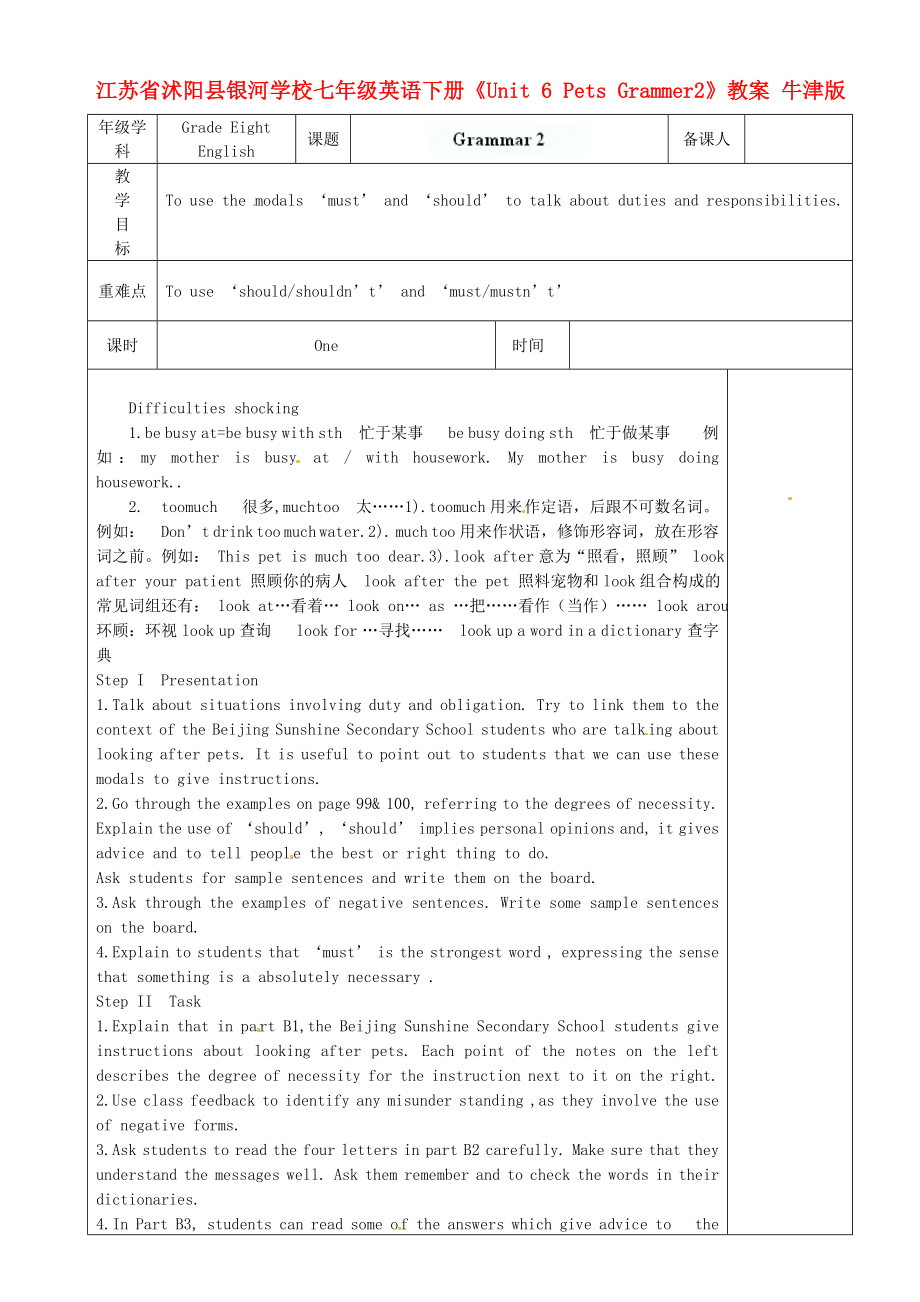《江蘇省沭陽縣銀河學(xué)校七年級(jí)英語下冊(cè)《Unit 6 Pets Grammer2》教案 牛津版》由會(huì)員分享�����,可在線閱讀��,更多相關(guān)《江蘇省沭陽縣銀河學(xué)校七年級(jí)英語下冊(cè)《Unit 6 Pets Grammer2》教案 牛津版(3頁珍藏版)》請(qǐng)?jiān)谘b配圖網(wǎng)上搜索���。
1、江蘇省沭陽縣銀河學(xué)校七年級(jí)英語下冊(cè)《Unit 6 Pets Grammer2》教案 牛津版
年級(jí)學(xué)科
Grade Eight
English
課題
備課人
教
學(xué)
目
標(biāo)
To use the modals ‘must’ and ‘should’ to talk about duties and responsibilities.
重難點(diǎn)
To use ‘should/shouldn’t’ and ‘must/mustn’t’
課時(shí)
One
時(shí)間
Difficulties shocking
1.be busy at=be busy with
2�����、 sth 忙于某事 be busy doing sth 忙于做某事 例如:my mother is busy at / with housework. My mother is busy doing housework..
2. too much 很多 , much too 太……1). too much用來作定語����,后跟不可數(shù)名詞。例如: Don’t drink too much water.2). much too用來作狀語�,修飾形容詞,放在形容詞之前��。例如: This pet is much too dear.3).look after意為“照看��,照顧” look
3����、 after your patient 照顧你的病人 look after the pet 照料寵物和look組合構(gòu)成的常見詞組還有: look at…看著… look on… as …把……看作(當(dāng)作)…… look around 環(huán)顧:環(huán)視 look up查詢 look for …尋找…… look up a word in a dictionary 查字典
Step I Presentation
1.Talk about situations involving duty and obligation. Try to link them to the context of
4�、the Beijing Sunshine Secondary School students who are talking about looking after pets. It is useful to point out to students that we can use these modals to give instructions.
2.Go through the examples on page 99& 100, referring to the degrees of necessity. Explain the use of ‘should’, ‘should’ i
5�、mplies personal opinions and, it gives advice and to tell people the best or right thing to do.
Ask students for sample sentences and write them on the board.
3.Ask through the examples of negative sentences. Write some sample sentences on the board.
4.Explain to students that ‘must’ is the str
6、ongest word , expressing the sense that something is a absolutely necessary .
Step II Task
1.Explain that in part B1,the Beijing Sunshine Secondary School students give instructions about looking after pets. Each point of the notes on the left describes the degree of necessity for the instruction
7����、 next to it on the right.
2.Use class feedback to identify any misunder standing ,as they involve the use of negative forms.
3.Ask students to read the four letters in part B2 carefully. Make sure that they understand the messages well. Ask them remember and to check the words in their dictionarie
8、s.
4.In Part B3, students can read some of the answers which give advice to? the writer of each letter. students check answers with a partner.
5.Divide the class into groups of four .one group comes to the front of the class and each member reads one letter at a time .
Step III ?Activity
Elicit
9��、 statements from students using different modals to talk about a situation ,e.g.,
A new student is joining the class .Ask what instructions can you give the new student? e
Step IV Exercises
根據(jù)句義或首字母寫出單詞或短語�����。
1.It is ________(必要的) to walk them in the park.
2.You should feed your pet o_______ a
10��、 day.
3.You ought to give them ________(干凈的)water.
4.We can find its fur all o________ our flat.
5.You o_______ to play with your friends.
選擇正確的詞語填空(每個(gè)限用一次)
(do, don’t, should, should not, ought to, ought not to, must, mustn’t, can, can’t, may)
1.If your cat pet is in the street, a car ______
11�、__ hit you.
2.Dolphins ________ “Walk” on water for a short time.
3.We students ________ study hard for our country.
4.If you feel lonely, you ________keep a pet.
5.You ________ play with your pet for some time every day.
6.________ your exercises all by yourself, please.
7.________beat you
12�、r pet cat or dog.. It’s not right.
8.You ________ speak while you are eating.
9.It’s raining outside. You________ go out.
10.According to the law, anyone ________kill any pet.
11.Although he is very good at his school subjects, he ________get dressed by himself.
13、
Grammar 2
You must arrive at school at 8.10 in the morning.
You should walk slowly on the stairs .
You should hand in your homework to the monitor.
The class has to choose a class monitor .Ask What are his/her duties ?e.g.,
He /she must collect the exercise books .
He/she should make sure that students follow the school rules.
板書設(shè)計(jì)
教學(xué)反思
 江蘇省沭陽縣銀河學(xué)校七年級(jí)英語下冊(cè)《Unit 6 Pets Grammer2》教案 牛津版
江蘇省沭陽縣銀河學(xué)校七年級(jí)英語下冊(cè)《Unit 6 Pets Grammer2》教案 牛津版

